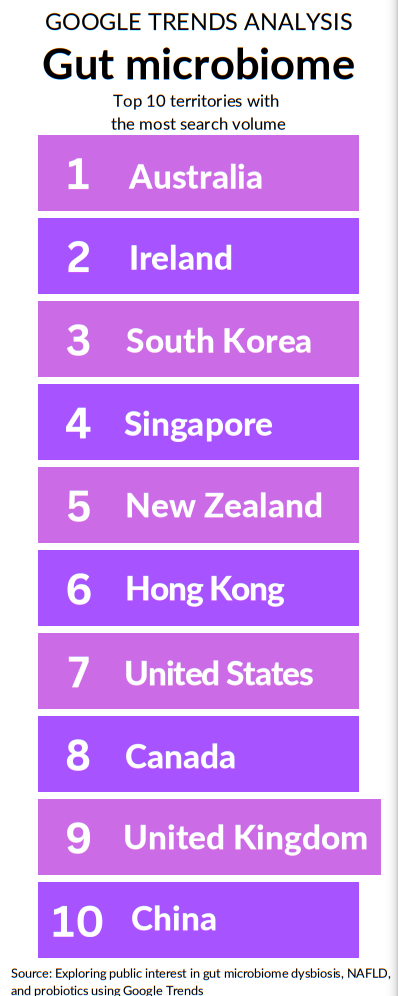Google Trends shows Australia tops global searches for gut microbiome, gut probiotics

Findings of the analysis, published on Scientific Reports, also found that Asia-Pacific countries such as New Zealand and Singapore were also in the top 10 countries with the highest searches on these terms.
New Zealand is second to Australia when it comes to searches on “gut probiotics” and “dysbiosis”, with a relative search volume (RSV) of 81 and 82 respectively. Australia, with the highest volume of searches, has an RSV of 100.
New Zealand also ranked fifth in terms of its volume of searches on “gut microbiome”, accounting for a relative search volume of 71.
Singapore, on the other hand, ranked fourth in the volume of searches for “gut microbiome” and “gut probiotics”, and ranked number 10 for search volume on “dysbiosis”, with an RSV of 75, 68, and 35 respectively.
The US, which is the world’s largest nutraceutical market, came in fifth for “dysbiosis”, sixth for “gut probiotics” and seventh for “gut microbiome”, with an RSV of 55, 57, and 68 respectively.
China, despite having restricted access to Google, came in 10th for RSV for “gut microbiome”, with an RSV of 41.
Elsewhere in India, the RSV on “gut probiotics” was among the five countries with the least searches and has an RSV of 14.
Vietnam also has a low volume of searches on “dysbiosis” with and RSV of five.
The analysis was conducted by researchers from Italy’s University of Catania, based on data collected between January 1, 2007, and December 31, 2022.
The analysis focused on the RSV for four terms, namely “gut microbiome”, “gut probiotics”, “dysbiosis”, and “NAFLD” or non-alcoholic fatty liver disease.
“These data change over time and have a geographical distribution that could reflect the epidemiological worldwide condition of NAFLD and the state of the probiotic market,” said the researchers.
Global search trajectory
Globally, the RSV for “gut microbiome” saw the biggest growth, skyrocketing by 1,400 per cent between year 2007 and 2022. Common related search terms were “human gut” and “human microbiome”.
This was followed by “gut probiotics”, where RSV was up 829 per cent, with “gut health probiotics” and “gut health” as the common related search terms.
On the other hand, the RSV of “NAFLD” was up 795 per cent and 267 per cent for “dysbiosis”.
The study was conducted to analyse the public’s interest in gut microbiome dysbiosis, NAFLD, and the use of gut probiotics globally.
“The most widely used free tool for analysing online behaviour is Google Trends, which can also give real-time data about trends and changes in online interest over time for different terms and themes.
“In a recent study, Mikoła et al. showed how interest in probiotic-related information may be correlated with antibiotic consumption, health expenditures, and the country's level of development,” said the researchers.
Other APAC countries which have made it into the top 10 include Malaysia, which ranked 10th on the RSV for “gut probiotics”, with an RSV of 24.
South Korea and Hong Kong ranked third and sixth for their searches on “gut microbiome”, with an RSV of 84 and 71 respectively.
South Korea, Singapore, Philippines dominate searches on NAFLD
South Korea has the highest volume of searches on NAFLD globally, while Singapore and the Philippines both came in second with an RSV of 73.
Australia was behind the United Kingdom and Canada with an RSV of 55.
This is followed by Sri Lanka, the US, Bangladesh, and Hong Kong.
The researchers noted that the interest in NAFLD corresponded with the prevalence of the disease across APAC.
In Singapore, for example, the number of people living with NAFLD is expected to increase from 1,492,000 in 2019 to almost 1.8 million in 2030.
At least one-third of the general population in the Philippines has the disease, with a prevalence rate of 38 per cent, higher than the global rate of 25 per cent.
“It is believed that the rising prevalence of NAFLD in the Asia–Pacific area is due to the widespread adoption of Western food and lifestyle practices and predisposing genetic factors among many different communities.
“Rapid industrialisation in many Asian nations has led to a shift toward sedentary behaviours and overnutrition, both of which are strongly linked to metabolic problems,” said the researchers.
However, Vietnam, unlike most of the APAC countries, was among the five countries with the lowest volume of searches on NAFLD, with an RSV of five.
Although obesity and diabetes are well-known risk factors for NAFLD, the researchers highlighted that a sizable population in the Asian region suffers from the disease despite having a healthy weight.
“It is expected that the number of people diagnosed with NAFLD and NASH throughout Asia will continue to rise, especially in rapidly aging populations, who are more likely to develop chronic lifestyle-related illnesses,” they said.
On the other hand, the gut-liver axis is increasingly recognised as the underlying cause of NAFLD.
“NAFLD is facilitated by a dysfunctional gut-liver axis, which affects hepatocyte lipid and glucose metabolism and disturbs the equilibrium of inflammatory mediators.”
Source: Scientific Reports
Exploring public interest in gut microbiome dysbiosis, NAFLD, and probiotics using Google Trends.
DOI: 10.1038/s41598-023-50190-5
Authors: Pezzino S, Sofia M, Mazzone C, Litrico G, Agosta M, La Greca G, Latteri S.



















